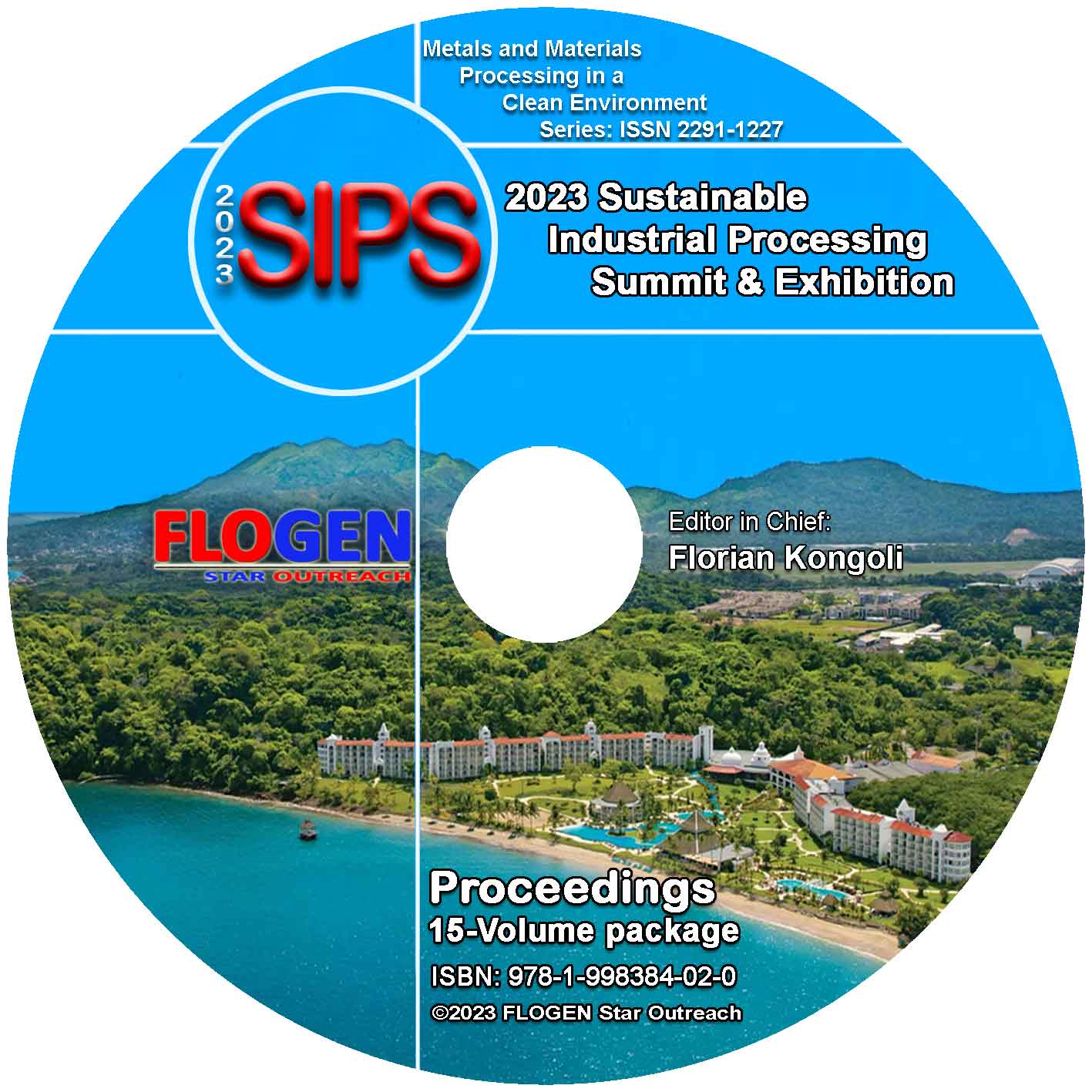2023-Sustainable Industrial Processing Summit
SIPS2023 Volume 15. Intl. Symp on Advanced Materials and Modelling of Complex Materials
| Editors: | F. Kongoli, F. Marquis, N. Chikhradze, T. Prikhna, O. Adiguzel, E. Aifantis, R. Das, P. Trovalusci |
| Publisher: | Flogen Star OUTREACH |
| Publication date: | 21 December 2023 |
| Pages: | 288 pages |
| ISBN: | 978-1-998384-00-6 (CD) |
| ISSN: | 2291-1227 (Metals and Materials Processing in a Clean Environment Series) |

CD shopping page
DECARBONIZATION OF EXTRACTIVE METALLURGY PROCESSES OF NON-FERROUS METALS BY THE INTRODUCTION OF HYDROGEN AS A REDUCING AGENT
Ana Cecilia Rios Porfirio Ferreira1; Paulo Assis2;1UNIVERSIDADE FEDERAL DE OURO PRETO, Buxtehude, Germany; 2UFOP, OURO PRETO, Ouro Preto, Brazil;
Type of Paper: Regular
Id Paper: 43
Topic: 71
Abstract:
The achievement of COP-21 targets is of utmost importance in addressing global climate change concerns. The metal industry, a significant source of greenhouse gas emissions, accounts for approximately 7.9% of direct process application emissions. Notably, the production of non-ferrous metals such as nickel, cobalt, and copper contributes substantially to these emissions. For instance, nickel production yields approximately 13 t CO2 emissions per ton produced, cobalt can reach as high as 28 tons of CO2 emissions per ton produced, and copper results in around 3 tons of CO2 emissions per ton produced. The copper industry alone accounts for 0.2% to 0.3% of global CO2 emissions. To address this challenge, the use of hydrogen as a reducing agent in extractive metallurgical processes emerges is perceived as a promising mitigation to reduce the carbon footprint of these metals, provided that the hydrogen is produced through renewable sources of energy. Adopting hydrogen as a clean alternative holds significant potential in mitigating the environmental impact and facilitating the energy transition through this leading metals.
This article investigates the reduction in carbon source consumption during the production of non-ferrous metals, focusing on the use of hydrogen as a substitute for coal and natural gas in the extractive metallurgy of cobalt, nickel, and copper. These metals play a crucial role in the energy transition. The key objectives of this study are to explore possible approaches for introducing hydrogen in the extractive metallurgy routes of these leading metals.
To achieve these objectives, the research employs a multi-faceted methodology. Initially, existing production processes are thoroughly mapped and analyzed to identify those heavily reliant on carbon sources. Subsequently, stoichiometric and thermodynamic aspects are studied and designed to understand the potential introduction of hydrogen as a reducing agent. The reaction kinetics and morphologies are investigated, allowing for the observation of key characteristics. Additionally, potential benefits and risks associated with the proposed change are raised and assessed.
The main findings highlight the physical and chemical feasibility of using hydrogen to facilitate reduction reactions in the extractive metallurgy of nickel, cobalt, and copper. However, the primary challenge lies in effectively controlling these reactions, necessitating precise operational adjustments and physical modifications to furnaces and dosing points. The analysis of reaction kinetics and morphologies emphasizes the importance of robustness in achieving the desired transformation of extractive metallurgy processes.
In conclusion, this study successfully elaborates on approaches for introducing hydrogen as a substitute for carbon sources in the extractive metallurgy of key non-ferrous metals. The findings indicate the technical feasibility of the reduction reactions while emphasizing the need for meticulous control. This research contributes to the ongoing efforts in the energy transition and promotes environmentally friendly practices in the production of non-ferrous metals.